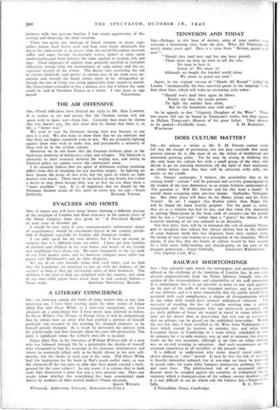DOES CULTURE MATTER ?
Sne,—So urbane a writer as Mr. E. M. Forster cannot easily fall into the slough of pessimism, but one may conclude that under present stresses he is, like most of us, the victim of intellectual and emotional growing pains. Yet he may be wrong in thinking that the only hope for culture lies with a small group of the elect, who decide to go on enjoying themselves till the light of their enjoyment so shines before men that they will be attracted, willy nilly, like moths to the candle.
Mr. Forster underrates, I believe, the probability that in the coming world culture " will be pursued and actively promulgated by the leaders of the new democracy to an extent hitherto undreamed of. The question is: Will Mr. Forster and his like lend a hand? It would mean scrapping some pre-war heroes. Sophocles, Velasquez, yes. But what place will there be for Henry James and his Ivory Tower? In art, I suggest that Ruskin rather than Roger Fry will be found the more fruitful prophet. For the point is, surely, that art as a religion has had its day, and that when Fry demurred to putting Shakespeare in the front rank of creators—on the ground that he was a " purveyor " rather than a " priest," his theory of the essential meaning of art was reduced to an absurdity.
Our first duty, then, will be to renounce the cult of esoteric blisses, and to recognise that culture has always thriven best in the shadow of some humane myth that has disposed, from their earliest years, the minds of men and women to a perception of the beautiful. Which means, if you like, that the future of culture would be best assured by a little more bible-reading and church-going on the part of the younger generation.—Yours faithfully, GEOFFREY WHITWORTH. The Garrick Club, W.C.






























 Previous page
Previous page